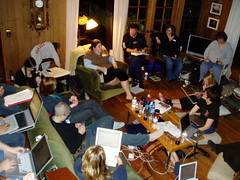partial response to Sour Duck's take on the women's visibility panel
This is in response to Sour Duck’s commentary on SXSWi and specifically on the panel I was on… I commented it on her post but then realized it’s so long I might as well repost it here. And I have a lot more to say later in response to her comments on other panels!
*******
First, I do know that some people got where I was coming from, and got something out of it.
I was trying to avoid having to explain what the patriarchy was or defend the very idea that sexism exists in general or on the web or in tech. Without having to explain that, I knew we could push much further into “So now what.” I was not there to do Feminism 101 for SXSWi. That would be a different panel… It might be quite useful to have it, as well as a panel of “And here’s about 8 bazillion examples of evil sexism that I as a woman in tech have experienced.” Which, actually, all of us on the panel talked about to some extent, but decided was not the point.
I think Jan’s position was to approach the solution by facing down internal barriers women have that make them feel that self-promotion is wrong. Her solution was not just “kick ass 10 times more than the men around you”… but also “and don’t forget to tell the world about it.” What she was saying on the panel was a direct demonstration of that philosophy. Not to wait to be asked, or looked for, but to step up and say “I’m great at my work and here’s why and here’s how to find me.” I agree with Jan that this is crucial. Diffidence and niceness isn’t going to help fix anything. I think it’s possible to do this without becoming part of the problem – i.e. do it without stepping on anyone else.
I wanted, though, to take a different approach. I suggested a systemic technological fix — as the furthest thing I could think of from Jan’s solution. (At least, the furthest thing that seems within women’s grasp, and that doesn’t involve violent revolution.)
I was not suggesting tagging. Instead, two things: an extension to xml, something like xfn, that people could use to mark up their pages to indicate authorship and identity. It could be built in to existing tools, or added to whatever people like Kaliya are doing with identity authentication layers, or be xml… but it would create standards for people to declare their identities or affinities – including gender, but I also mentioned race as an example. There’s room for discussion of what that would look like.
The second part of my proposal is that tools be built to use that information. Currently, we look at a set of all pages (for google or other search engines) or of blogs (for Technorati or whatever other blog-specific search engines.) so we know by Technorati’s algorithms what blogs are considered the most important by other bloggers. We *can’t* ask the question, “Who are the most important bloggers in the view of all the *women* bloggers?” or “in the view of all the *non-male* bloggers?”
If we had gender identity data we could see if the answer to that question. What blogs do women rank most highly? What blogs do men rank most highly? What male-identified ( tiny joke…) blogs do non-males think are most interesting? etc. Extend this to race and you might see how it could be both fascinating and useful.
The mere fact that those answers would all be different means that we should do it and see what the answers ARE. Also, seeing their differences shows directly how we construct “value” and ranking, and how that value depends on the identity of the constructors. So what I am suggesting is actually rather radical. I am saying that tech can give us a direct way to take the power of constructing value, and own it, and make it very very transparent.
Of course that data could be used for scary purposes, but…. I guarantee you it already IS… or will be. So why not build it to be open and used by everyone?
Not everyone would identify themselves, but enough would that we would get interesting data. It would actually allow us to “name the problem” MORE than we can now with existing vision.
It would make women more visible to each other, and it would also make them more visible to men who cared to look at what women’s standards of aesthetics, usefulness, and value are.
You might argue that it will not matter if those aesthetics are visible; patriarchy basically guarantees that women’s standards and power will be denigrated, belittled, etc. In other words what women assert is valuable, patriarchy will devalue *because* women like it. One merely has to breathe a hint that “teenybopper girls” or “housewives” like something for it to become the epitome of unpowerful. Consider romance novels; they *sell*. By all rights their continued existence should change something about what is considered valuable – they have this huge economic power. But… are they Literature? Somehow… (sarcasm) Not. HOrribly.. I remember this same dynamic being pointed out to me when I first joined the STC in the early 90s – I was warned that because women were succeeding in “infiltrating” tech writing, tech writing was going to become a low-power pink-collar job. THAT sort of thing. Anyway, you could argue this against what I’m proposing. And you would be quite right to argue it. I don’t think it’s a good reason for not DOING it, though.
Tara and Virginia had other things to say, but I thought I’d try to make my own statement a little more clear.
My 2 metaphors, which I just didn’t have time on the panel to go into, and I realized they were too wacky to pass without a lot of explanation… were … well… “radical fuzzy separatism” which just cracked me up as a name… because I’m suggesting a temporary separatism and one with fuzzy boundaries. The other metaphor is of Maxwell’s Demon. Think of patriarchy, or racism, as being Maxwell’s Demon, i.e. an invisible and imaginary and impossible Agency, a being sitting at the tiny doorway between two chambers and keeping them separate… picking particles out of the air with tiny tweezers, perhaps… We could shoot the demon maybe; we could point out who’s wearing the demon suit; we could exhort various particles to whiz around faster so they can trick the demon and get through the door; what I was proposing is to recognize the shape of the system itself and, well, drill some new holes between the two chambers. But first you have to know where the walls are.

